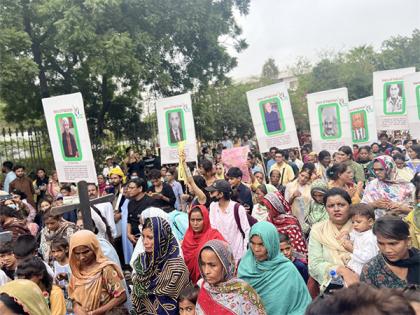Minority Rights March 2025 demands end to forced conversions, equality and constitutional reforms in Pakistan
By ANI | Updated: August 11, 2025 12:59 IST2025-08-11T12:53:47+5:302025-08-11T12:59:59+5:30
Karachi [Pakistan], August 11 : The Minority Rights March 2025, held on Sunday, saw participants voicing crucial demands aimed ...

Minority Rights March 2025 demands end to forced conversions, equality and constitutional reforms in Pakistan
Karachi [Pakistan], August 11 : The Minority Rights March 2025, held on Sunday, saw participants voicing crucial demands aimed at protecting minority rights and promoting equality across Pakistan.
As reported by Dawn, the marchers called for an end to forced conversions, equitable and quality education, safeguarding minority communal property, amendments to Articles 41 and 91 of the Constitution, and prevention of the misuse of blasphemy laws.
Minority rights activist Luke Victor expressed the community's grievances, saying, "Despite having been independent for 78 years, we still do not feel free because our young daughters are forcibly converted and married off, because our children do not receive equal opportunities, and because we face discrimination. We seek liberation from discrimination and the derogatory term 'Bhangi.' We are equal citizens of this nation."
Nathan Danyal addressed the challenges faced by minority students in Pakistan. "One of our eleven demands is related to education. Numerous schools in this country were established by Christians, Parsis, and Hindus, such as the NJV School founded by a Hindu, missionary schools initiated by Christian missionaries, and the BVS and Mama Parsi Schools created by Parsis. Since 1947, these schools have opened their doors to Muslim students, but how many minority students are enrolled there today?" he asked, advocating for at least 10 percent of minority students from underprivileged backgrounds to receive scholarships for admission to these institutions.
Pastor Naomi Bashir highlighted the severe shortage of nurses in the country. "Our country needs around nine lakh nurses. Please work on increasing their numbers," she said, pointing out that about 70 percent of nurses serve in the private sector while the government sector lags behind. "In the government sector, nurses remain stuck in grade 17 for many years. They deserve promotions, as it is their right. They deserve respect," she added.
Safina Gill spoke on job discrimination and the quota system, noting that non-Muslims are often limited to menial jobs like sanitation work. "Even educated non-Muslims are frequently offered sanitation positions through job advertisements," she said. She recalled that the late Federal Minister for Minorities Shahbaz Bhatti had introduced a five percent job quota for minorities in 2009, which has since diminished. "The eligibility criteria for jobs are made excessively difficult for non-Muslims, even when they qualify. We require new policies to tackle these issues," she asserted.
Minority rights activist Faqir Shiva Kutchhi condemned the ongoing forced conversions and marriages of minor non-Muslim girls despite laws like the Child Marriage Restraint Act. "It appears that this legislation applies only to minor Muslim girls and not to those from non-Muslim backgrounds," he said. "We possess B-Forms to verify the ages of abducted children, yet no one pays attention. There is a lack of concern."
Sardar Ram Singh, representing the Sikh community, stressed that sanitation work should not be assigned to the descendants of the land. "Our forebears established reputable educational institutions in Pakistan. We cherish Pakistan as well; it is also our homeland. Cease the forced conversions, protect our places of worship, and listen to us, as we are also part of this nation," he urged.
Human rights advocate and classical dancer Sheema Kermani told Dawn that three Minority Rights Marches have been held so far, including the recent one, all effectively highlighting the issues faced by religious minorities in Pakistan. "To create a just and equitable society, we must put an end to the critical problems of forced conversions, religious discrimination, and the propagation of hatred against minority faiths," she emphasized.
Participants in the Minority Rights March moved from the YMCA grounds to the Sindh Assembly Building, presenting eleven fundamental demands to the public. These included calls for reforms in public and private education systems, curriculum adjustments to remove discriminatory content and hate speech, and promotion of respect for minorities, pluralism, peace, harmony, ethics, and acceptance of diversity.
The marchers also demanded the return, repair, renovation, and restoration of all non-Muslim seized or desecrated properties, constitutional amendments to replace the term 'non-Muslim' with language recognizing respective religious identities, and changes to Articles 41 and 91 of the Constitution.
They called for actionable steps, including the establishment of a high-powered judicial commission to investigate and address misuse of blasphemy laws. The demands also urged fostering a culture of inclusiveness by celebrating minority religious festivals nationally and ensuring holidays for employees and students during these festivals in both public and private sectors.
Disclaimer: This post has been auto-published from an agency feed without any modifications to the text and has not been reviewed by an editor
Open in app
